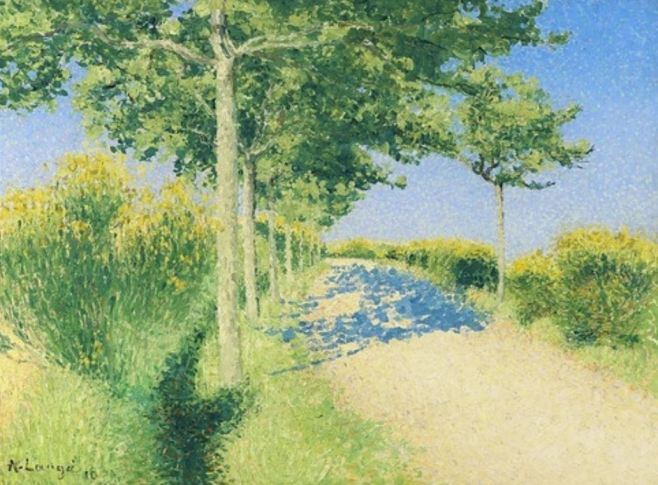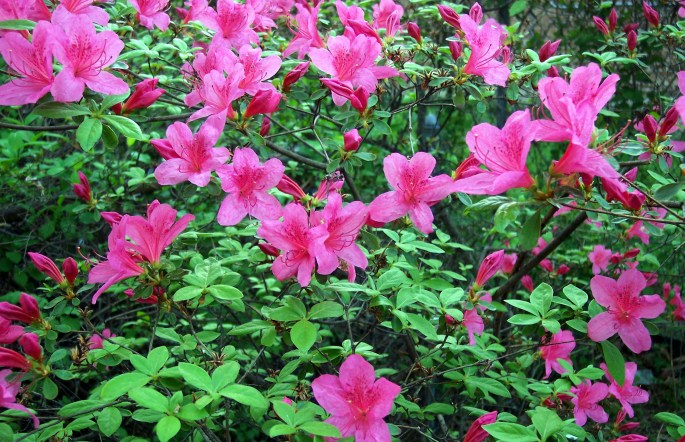“Spring Landscape,” by Achille Laugé (French, 1861–1944). Laugé was a Neo-Impressionist painter born in Arzens. Laugé never followed his teachers’ methods and advice, and his work was considered radical for its time. Influenced by French Neo-Impressionist painters Georges Seurat (1859–1891), Paul Signac (1863–1935), and Camille Pissarro (1831–1903), Laugé adopted elements of their style without aligning himself with Seurat’s strict and scientific method.–Wikipedia
Speaking of Spring, I took the opportunity a few weeks ago to photograph the signs of Spring right in my own yard around the house, and as it turned out, it would be the last sunny day for a while. I was cautiously optimistic on this sunny afternoon and captured some of the essential sights that I see each year about this time.
Right after I captured these images, we began to endure one of the longest runs of continuously rainy days in recent memory these past two weeks, and it reminded me of a passage from Hemingway:
“Sometimes the heavy cold rains would beat it back so that it would seem that it would never come and that you were losing a season out of your life…You expected to be sad in the fall. Part of you died each year when the leaves fell from the trees and their branches were bare against the wind and the cold, wintry light. But you knew there would always be the spring, as you knew the river would flow again after it was frozen. When the cold rains kept on and killed the spring, it was as though a young person had died for no reason.
In those days, though, the spring always came finally but it was frightening that it had nearly failed.”
― Ernest Hemingway, passage from “A Moveable Feast.”
After the terrorist incident in Paris in November of last year, “A Moveable Feast” became a bestseller in France. According to a CNN report by Watson, Ivan, and Sandrine in November 2015 called “Sales Surge for Hemingway’s Paris memoir, “the book’s French-language title, “Paris est une fête,”…was a potent symbol of defiance and celebration. Bookstore sales of the volume surged, and copies of the book became a common fixture among the flowers and candles in makeshift memorials created by Parisians across the city to honor victims of the attacks.”
First page of a miniature of Cicero’s “De Oratore,” 15th century, Northern Italy, now at the British Museum
“Historia magistra vitae est,” is a Latin expression, taken from Cicero’s “De Oratore” which translates to “History is life’s teacher.” According to Wikipedia, “…The phrase conveys the idea that the study of the past should serve as a lesson to the future.” Cicero writes eloquently in “De Oratore,” about how “…An orator is very much like the poet. The poet is more encumbered by rhythm than the orator, but richer in word choice and similar in ornamentation.”
This relentless run of rain and overcast skies has had the beneficial affect of keeping me indoors to read and contemplate my thoughts in a way that I don’t usually get the opportunity to do when the weather is better, and the following quote from Cicero’s work struck me as I reviewed it the other day:
“Nevertheless, since philosophy is divided into three branches, which respectively deal with the mysteries of nature, with the subtleties of dialectic (inquiry into metaphysical contradictions and their solutions), and with human life and conduct, let us quit claim to the first two, by way of concession to our indolence (laziness), but unless we keep our hold on the third, which has ever been the orator’s province, we shall leave the orator no sphere wherein to attain greatness. For which reason this division of philosophy, concerned with human life and manners, must all of it be mastered by the orator; as for the other matters, even though he has not studied them, he will still be able, whenever the necessity arises, to beautify them by his eloquence, if only they are brought to his notice and described to him.”
It has occurred to me that my poetry, my sense of history, and my earnest deliberations in studying the philosophical aspects of our human subjective awareness have all been in the service of the mysteries of nature, the subtleties of dialectic, and with human life and conduct, and although I don’t feel particularly “encumbered by rhythm,” a recent poem erupted from me that seems to address these mysteries in the way that Cicero suggested is often produced as “necessity arises.”
Every nuance of the life within me
Yields to the power of the
Divinity within this sacred place
We are building together.
Across the eons of time,
Through centuries of human presence on Earth,
The world within has blossomed and flourished,
While the life of the body without
Struggles to continue.
Nature reveals itself only slowly
To the spirit, like a flower
That opens at twilight.
Abiding with you in the deepest
Union of souls of my short life,
The goddess breathes life into our
Sensual union and intensive mingling
Of spirit and intimate places.
Sitting at length within her grasp,
I submit willingly to the opening
Of my soul by her gentle hand.
My tortured heart cries out silently–
While the spirit mends.
© May 2016 by JJHIII24









Beautiful post with more beautiful pictures… 🙂
Thank you so much for the compliment! Even though the flowers and plants around the yard are quite common and seem to return each Spring without my intervention, they always seem to create a nourishing inspiration and pleasing visual landscape as though a talented gardener or florist created them.
I am encouraged by your thoughtful response and appreciate your visit as always.
Kind regards….John H.
I love flowers…from the gorgeous roses to tiny wildflowers- they attract me in the same way. 🙂